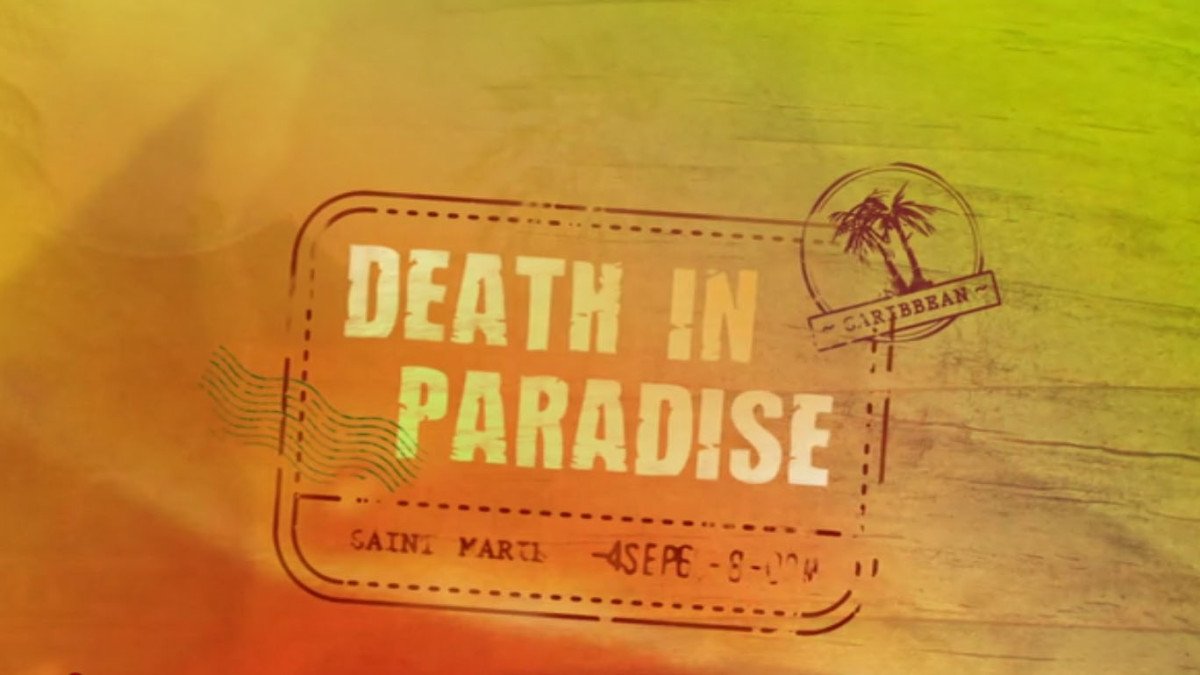Plagiarism in Pop Culture: Death in Paradise
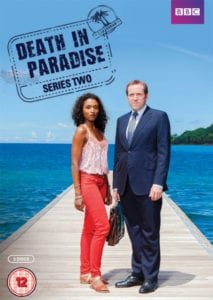
Death in Paradise is an ongoing British crime drama series that is set on the fictional Caribbean island Saint Marie.
Though the characters of the show have changed over the years, the premise is unchanged.
Saint Marie is a fictional British overseas territory, and, because of that, a detective inspector (DI) is sent from the UK to the island to help investigate murders that take place on the island.
To that end, there’s been a lot of murder on that tiny island with some 78 and the tenth season still underway.
However, it’s all the way back to season 2, with the show’s original DI, Richard Poole, that we must travel for this edition of Plagiarism in Pop Culture.
There, in episode 7, entitled A Stormy Occurrence (or A Deadly Storm according to IMDB), Poole is tasked not only with tracking down a killer, but do so while staring down a hurricane and trying to understand the complicated world of academia.
Content Warning: Spoilers for Death in Paradise Season 2, Episode 7
The Plot
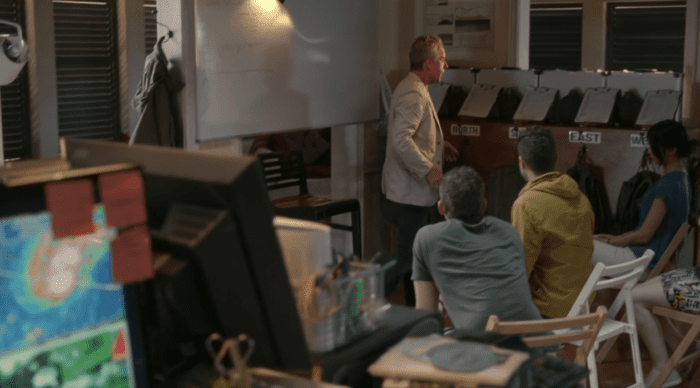
The episode begins at the university as four students and their instructor are preparing for an incoming hurricane. There are five weather stations on the island and the professor sends himself and each of the students out to separate stations to take readings and photographs ahead of the storm.
One of the students, Leo Downs, switches with his colleague so he can stay at the central one and be closer to the university for something he had to do.
However, after Leo takes his measurements, he is killed, and the episode begins properly.
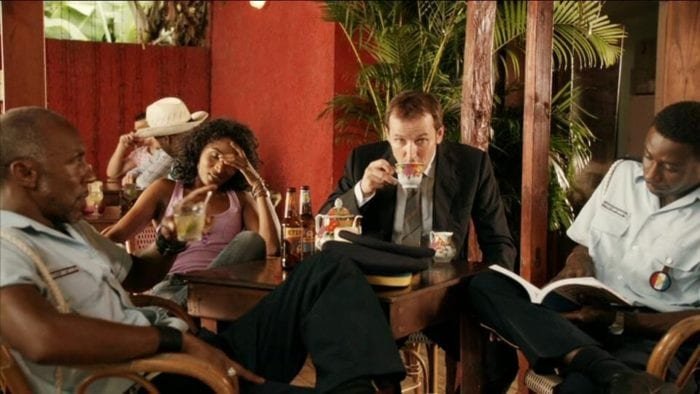
There, Downs is sitting with his fellow police officers and comically underestimating the importance of the hurricane. However, before they can get too far in the conversation, they are told about the murder and there they find Leo’s body among the rubble of the weather station.
Poole deduces that they weren’t meant to find the body until after the storm and that it was staged as if the storm had killed him. However, when the dean of the meteorology program found the body early, the plans were thrown into disarray.
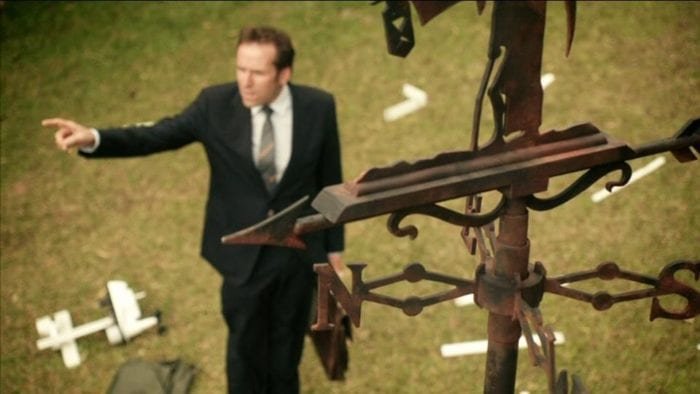
That discovery, however, wasn’t a coincidence. Leo had called and asked to meet the dean saying he had something important to tell her. That is why she found him when she did.
The detectives set about interviewing the other three students as well as Professor King. They quickly discovered pretty much everyone had a reason to dislike Leo but all had alibis, namely their readings and photographs at the other weather stations.
Professor King was of particular interest to the detectives both because of his close relationship with Leo and his situation. King was publishing a book and was generally more well-regarded than one would expect for a professor at such a small school.
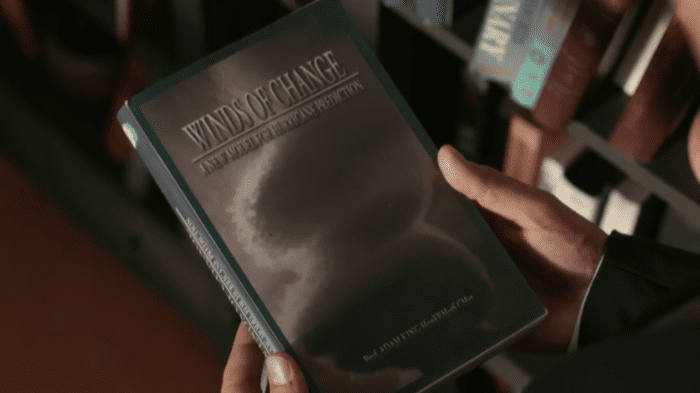
They even uncovered a possibly unethical report he filed in favor of oil derricks, but that trail ended when the school was already aware (and supported) what he did.
After getting stranded by the hurricane, the detectives hone their investigations in on a weather balloon that was launched by Leo just before the murder. They find it, but the video doesn’t capture the killer, only Leo saying the evidence is safe.
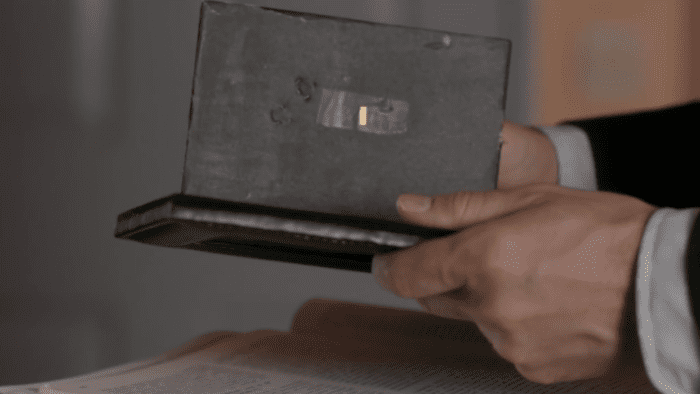
This prompts a second search of Leo’s room where Poole finds a memory stick that Leo had wanted to keep hidden.
Poole then calls the students, Professor King and the dean together and reveals that Professor King’s book was a plagiarism, “virtually word for word”, of Leo’s manuscript. Poole went on to say that the reason King stayed so close to Leo was to steal his work and he killed him to protect his newfound reputation.
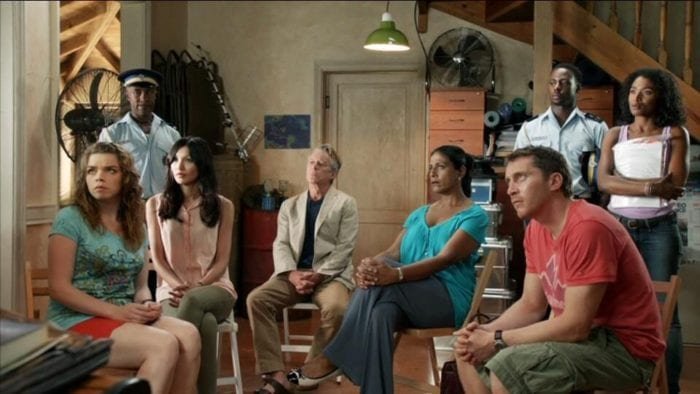
Professor King then argued that, in academia, attribution is shared. Poole responds pointing out that only King’s name is on the book. King then says that plagiarism cases never stick and that students, researchers, etc. always assume they’ve done more worth than they have. Poole responded saying that “Plagiarism is abuse” and asked if that’s what King told Leo when he confronted him.
Poole then proved that the photograph Professor King took was altered to look like it was taken at the same time as the murder. With the evidence in hand, Professor King is arrested for the murder of Leo Downs and the episode draws to a close.
Understanding the Plagiarism
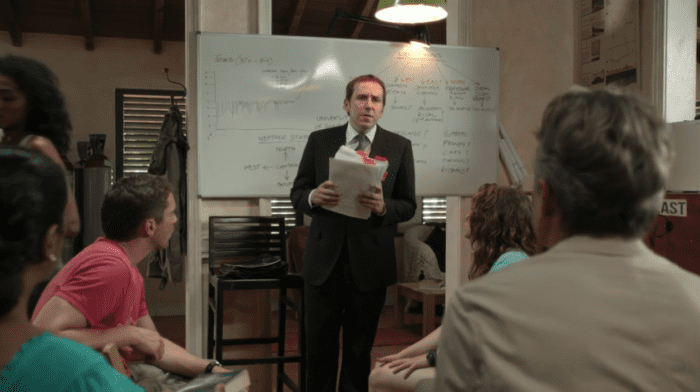
The episode itself focuses on Professor King’s book but the allegations of plagiarism run much deeper. According to Poole, King didn’t just base his book on Leo’s manuscript, but used his ideas to blossom from a small-time professor to someone at the top of his field.
This is a fear that many in academia have. We saw this in the previous Plagiarism in Pop Culture, which looked at the Tom Lehrer song Lobachevsky. In that song, an academic rose to the upper echelons of his field, including getting a movie deal, by simply plagiarizing his colleagues and beating them to publication.
However, where Lehrer is an academic and was satirizing that fear in academia, Death in Paradise is playing it much more straight.
To that end, Professor King actually made two valid points during the conclusion of the episode. First was that attribution is generally shared in academia and the second was that many students feel that their work was plagiarized and such cases rarely go anywhere.
Indeed, if the team had made a discovery and published their findings, it’s likely that King would have been the lead author even if he had done only a small portion of the work. This came up in the episode itself as Leo was jockeying for second author on a paper by the team.
Likewise, students do often voice concern that their work is underrepresented. We also saw that in the episode of Young Sheldon. However, as with the Young Sheldon episode, it’s usually cases of students feeling they contributed more than they had, and their claims go nowhere.
However, Professor King’s story is different. Publishing a manuscript that is almost word-for-word from a student is beyond the pale of either academic attribution sharing or misinterpreted contributions. Especially when you consider this was a mainstream publication, not an academic one, there’s no excuse for King’s plagiarism and he knew it.
When you add all this together, Death in Paradise packs a lot of plagiarism discussion into extraordinarily little time.
It would have been extremely easy for the show just to use plagiarism as a cheap excuse for Professor King to kill Leo. After all, the crux of the actual mystery centered around the timestamped photograph and how the killer was in two places at once. There was no real need to go deeper.
Instead, with very few lines of dialogue, they said a lot about academic plagiarism and what they said was accurate, just not applicable to this case.
Professor King was right when it comes to the norms of academic plagiarism. He had just stepped well outside those norms with his actions.
Bottom Line
The amazing thing about this episode is that, of its 57-minute runtime, only about 5-10 minutes of it dealt with plagiarism in any way. The show only briefly brushed the topic before the final reveal, which was only about 5 minutes long.
Still, they packed a lot into that time, and it was fairly accurate. Though Professor King was clearly deflecting, he spoke truths about attribution, citation and the nature of plagiarism in academia, especially between professors and students.
To repeat, this wasn’t something the show had to do. Plagiarism really wasn’t central to the episode’s plot and served more as a “gotcha” than a core theme of the show. There was no need to go this deep.
Yet, they did and it’s a notable example of how you can incorporate plagiarism into a show and respect the subject while, at the same time, using it as a trope.
More Plagiarism in Pop Culture (In Reverse Order)
Want more Plagiarism in Pop Culture? There Are 40 others to check out!
- Ferris Bueller
- Randy Feltface
- Bob’s Burgers
- Columbo (Part 2)
- Columbo (Part 1)
- Death in Paradise (Part 2)
- American Auto
- Saturday Night Live
- The Conners
- Death in Paradise (Part 1)
- Lobachevsky
- Back to School
- The Golden Girls
- Young Sheldon
- The Goldbergs (Part 2)
- King of the Hill (Part 2)
- Yesterday
- King of the Hill (Part 1)
- The Kids Are Alright
- Big Fat Liar
- Coco
- Re-Animator
- Elementary
- Instinct
- Fresh Off the Boat
- The Goldbergs (Part 1)
- Lou Grant
- Star Trek: The Original Series
- Arthur
- Criminal Minds
- Mystery Science Theater 3000
- Cheers
- WKRP in Cincinnati
- Boy Meets World
- Law & Order: Criminal Intent (Part 2)
- Law & Order: Criminal Intent (Part 1)
- Jane the Virgin
- The Waltons
- Leave it to Beaver
- The Facts of Life
Hat Tip: A big thanks to Chris Howes for the heads up on this episode!
Want to Reuse or Republish this Content?
If you want to feature this article in your site, classroom or elsewhere, just let us know! We usually grant permission within 24 hours.
